May 21, 2025 | 19:18 GMT +7
May 21, 2025 | 19:18 GMT +7
Hotline: 0913.378.918
May 21, 2025 | 19:18 GMT +7
Hotline: 0913.378.918
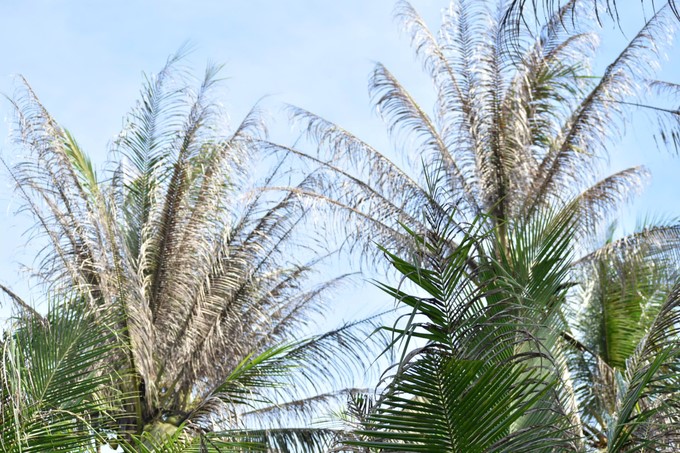
Black-headed caterpillars damage a coconut garden in Xuan Dong commune, Cho Gao district (Tien Giang). Photo: Minh Dam.
In Cho Gao district (Tien Giang province), a workshop recently took place to discuss solutions to manage black-headed caterpillars that cause damage to coconuts. The workshop was organized by the Tien Giang Department of Agriculture and Rural Development in collaboration with the Cho Gao District People's Committee. Recently, the area of coconuts infected with black-headed caterpillars has been recorded to increase again.
According to the Southern Regional Plant Protection Center (Plant Protection Department), the coconut black-headed caterpillar was first discovered in Binh Dai district, Ben Tre province, with an initial infected area of 2.4 hectares.
By October 2024, this dangerous pest is causing harm in six provinces, including Ben Tre, Tien Giang, Vinh Long, Tra Vinh, Soc Trang, and Kien Giang, with an infected coconut area of nearly 1,010 hectares. In addition, black-headed caterpillars have also been recorded in Tay Ninh. By October 10, the two localities with the largest area damaged by black-headed caterpillars were Ben Tre (594.7 ha) and Tien Giang (279.3 ha).
Tien Giang province has a coconut area of 22,400 hectares, concentrated in Cho Gao district (7,700 hectares), Chau Thanh (5,000 hectares), Tan Phu Dong (2,700 hectares), Go Cong Tay (2,500 hectares), and My Tho city (1,700 hectares), of which drinking coconut varieties account for 60%.
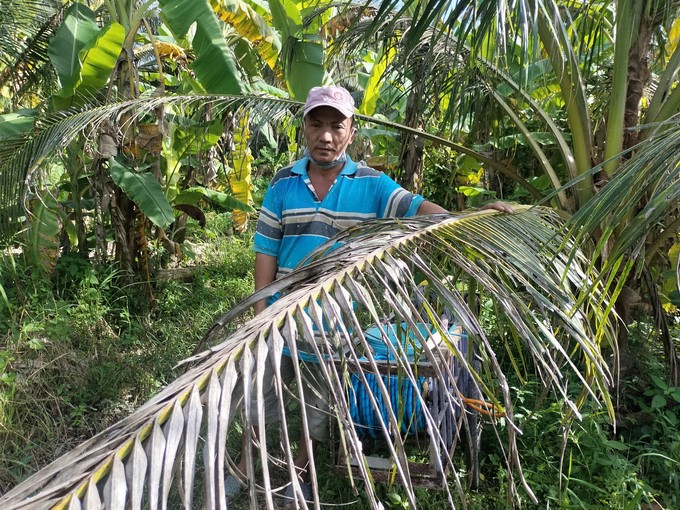
The majority of coconut growers respond to black-headed caterpillar prevention and control solutions recommended by the functional sector. Photo: Minh Dam.
In April 2021, the functional sector of Tien Giang province recorded the first appearance of black-headed caterpillars in Binh Ninh commune, Cho Gao district, with a harmful area of about 5 hectares belonging to 15 households. Prevention and control work was implemented promptly and urgently, so pest density was controlled and did not spread. However, by 2023, the area of coconuts infected with black-headed caterpillars had been recorded on 37 hectares belonging to 81 households in the Cho Gao area. By August 2024, the infected area had increased rapidly to nearly 200 hectares.
Although the Tien Giang agriculture and rural development sector has proactively investigated findings, disseminated information, and guided prevention and control measures to people, the prevention and control effectiveness is not high.
Mr. Vo Van Men, Director of the Tien Giang Sub-Department of Crop Production and Plant Protection, said that most coconut gardens infected with black-headed caterpillars are old, stunted, and tall, so it is difficult to detect and spray pesticides. In addition, under the coconut canopy is where people live and raise cattle and poultry, so chemical spraying will affect human and animal health, making it difficult to implement. Besides, a part of the population still relies on support from the State, so the effectiveness of suppressing the black-headed caterpillar epidemic is not high.
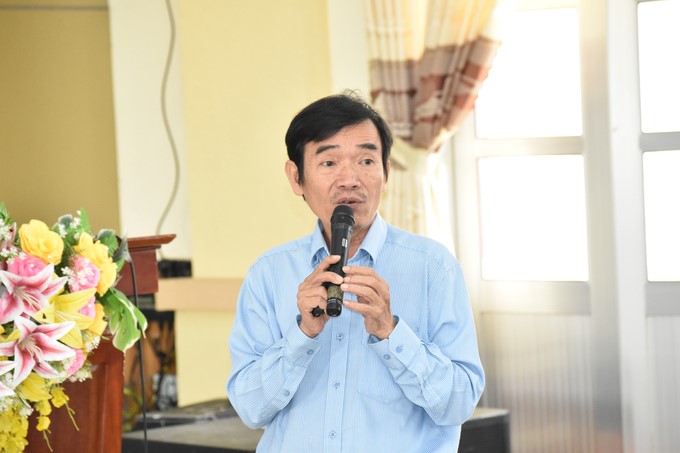
Mr. Do Van Van, Director of the Southern Regional Plant Protection Center, said that black-headed caterpillars currently damage over 1,000 hectares of coconuts. Photo: Minh Dam.
The workshop recorded six opinions on prevention and control solutions and research experiences of scientists and experts from the Southern Regional Plant Protection Center, the Southern Horticultural Research Institute, the Faculty of Agronomy (Ho Chi Minh City University of Agriculture and Forestry), the Ben Tre Provincial Sub-Department of Crop Production and Plant Protection, and Dr. Ho Van Chien, former Director of the Southern Regional Plant Protection Center.
Mr. Do Van Van, Director of the Southern Regional Plant Protection Center, said that there are three main measures to manage black-headed caterpillars, including manual, biological, and chemical measures. For the manual measure, when detecting pest-infected trees, damaged leaves should be cut off and destroyed by soaking in ditches or burning.
For the biological measure, use natural enemies to destroy catepillars or catepillar larvae. Natural enemies include bees that parasitize black-headed caterpillars and bees that parasitize black-headed caterpillar larvae. It is also possible to release Euborellia stali and weaver ants to attack and destroy black-headed caterpillars that damage coconuts.
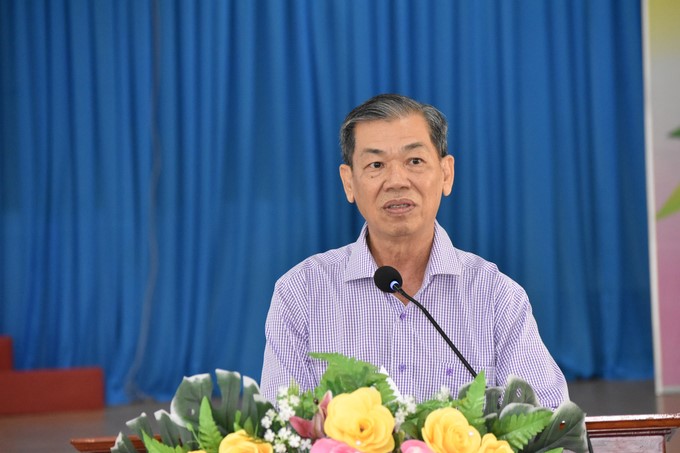
Mr. Nguyen Van Man, Director of the Tien Giang Department of Agriculture and Rural Development, assigned functional agencies and localities to disseminate solutions to control coconut black-headed caterpillars to people. Photo: Minh Dam.
With the consultation of experts and scientists, Mr. Nguyen Van Man, Director of the Tien Giang Department of Agriculture and Rural Development, said he will continue to organize a mass campaign to prevent and control black-headed caterpillars with both chemical and biological measures.
For coconut gardens mildly infected with pests, infected leaves will be pruned and destroyed, and biological measures such as using natural enemies and biological preparations to kill caterpillars and larvae will also be applied.
For moderately to severely infected coconut gardens, use the active ingredient Emamectin benzoate combined with mineral oil to control catepillar density before using natural enemies. This process needs to mobilize people to implement it simultaneously, determine the correct age of catepillars to spray, and spray according to the "4 right" principle, ensuring enough quarantine time. In addition, encourage people to cut down old, stunted, and ineffective coconut trees.
Translated by Thu Huyen
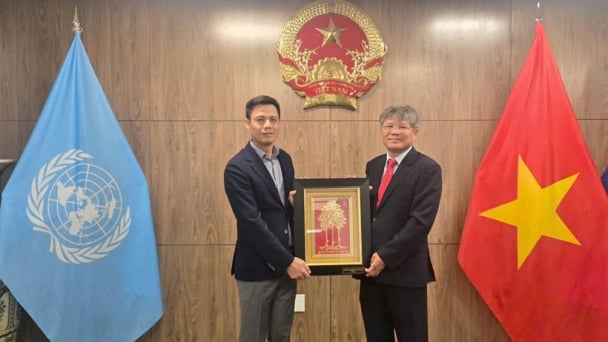
(VAN) VRG recently conducted a visit and working trip to the United States to demonstrate its efforts in redefining the role of rubber enterprises in the global value chain.

(VAN) In 2024, over 295 million people across 53 countries and territories faced acute hunger—an increase of almost 14 million people compared to 2023, while the number of people facing catastrophic levels of hunger reached a record high.

(VAN) World Environment Day 2025 (June 5) carries the theme 'Beat Plastic Pollution' continuing to emphasize the global urgency of addressing the plastic waste crisis.

(VAN) This was the assessment shared by experts at the workshop titled 'Assessing the Role and Potential of Low-Emission Rice Production Systems in Vietnam,' held on the morning of May 19.

(VAN) Cai Rong Port is the fisheries control center of Quang Ninh, helping to monitor fishing vessels, combat IUU fishing, and remove the EC's 'yellow card'.

(VAN) The German Agricultural Society (DLG) explores the possibility of establishing a mechanization service center in Vietnam’s Mekong Delta to support farmers in accessing and utilizing advanced machinery.

(VAN) On May 16, the Department of Water Resources Management, in collaboration with the Food and Agriculture Organization of the United Nations (FAO), held a signing ceremony for the GEF-8 project document.